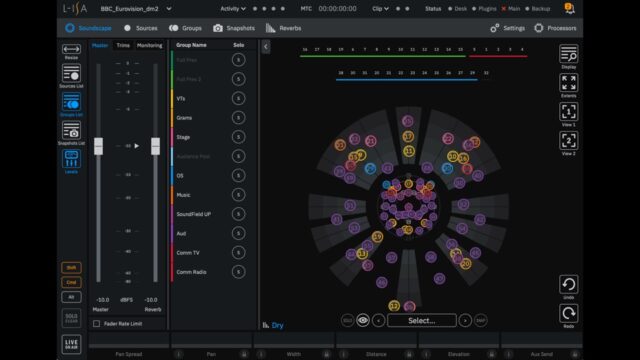¡Desconecta con la aplicación Player FM !
Eurovision Chat Over Coffee, BBC R&D’s Dave Marston And Eurovision’s Next Generation Audio
Manage episode 401945253 series 115027
We talk a lot about the songs of the Eurovision Song Contest here, we look at how the Song Contest allows cultures to be shared, and how the Contest is used as a live environment for testing new broadcast technologies. It’s the latter that’s the subject of today’s Chat Over Coffee podcast.
Liverpool’s hosting of the Eurovision Song Contest was a golden opportunity for the BBC’s Research and Development team to use the live environment for one of their many projects. How does an R&D team actually use the Song Contest?
Earlier this year, I sat down with Dave Marston from the BBC’s Research and Development to talk about one project. The team has been working on Next Generation Audio, which allows more interaction and personalisation of the audio presentation. This involves attaching metadata to as many of the files in the soundscape as possible… something that is easy to do on a pre-recorded show, less so for a live broadcast.
Which is where Eurovision comes in. How was the decision to use the Song Contest made, what facilities were needed, and how is the project still making a difference?
Eurovision Chat Over Coffee, BBC R&D’s Dave Marston And Eurovision’s Next Generation Audio
From immersive audio and standardised formats, through collecting the raw audio in Liverpool, to and having a ‘Eurovision Song Contest Simulator’ to test new techniques, Liverpool 2023 was a unique moment to test Next Generation Audio techniques.
Ewan Spence sits down with BBC R&D’s Dave Marston to talk about using the Song Contest as a platform to trial new broadcast techniques.

BBC R&D;s L-ISA Interface running with the Eurovision audio data (Image: BBC)
Discover more about the Eurovision Song Contest ahead of May’s show by listening to the ESC Insight podcasts. You’ll find the show on iTunes, Google Podcasts, and Spotify. A direct RSS feed is available. We also have a regular email newsletter, which you can sign up for here.
The post Eurovision Chat Over Coffee, BBC R&D’s Dave Marston And Eurovision’s Next Generation Audio appeared first on ESC Insight - Home of the Unofficial Eurovision Song Contest Podcast.
314 episodios
Manage episode 401945253 series 115027
We talk a lot about the songs of the Eurovision Song Contest here, we look at how the Song Contest allows cultures to be shared, and how the Contest is used as a live environment for testing new broadcast technologies. It’s the latter that’s the subject of today’s Chat Over Coffee podcast.
Liverpool’s hosting of the Eurovision Song Contest was a golden opportunity for the BBC’s Research and Development team to use the live environment for one of their many projects. How does an R&D team actually use the Song Contest?
Earlier this year, I sat down with Dave Marston from the BBC’s Research and Development to talk about one project. The team has been working on Next Generation Audio, which allows more interaction and personalisation of the audio presentation. This involves attaching metadata to as many of the files in the soundscape as possible… something that is easy to do on a pre-recorded show, less so for a live broadcast.
Which is where Eurovision comes in. How was the decision to use the Song Contest made, what facilities were needed, and how is the project still making a difference?
Eurovision Chat Over Coffee, BBC R&D’s Dave Marston And Eurovision’s Next Generation Audio
From immersive audio and standardised formats, through collecting the raw audio in Liverpool, to and having a ‘Eurovision Song Contest Simulator’ to test new techniques, Liverpool 2023 was a unique moment to test Next Generation Audio techniques.
Ewan Spence sits down with BBC R&D’s Dave Marston to talk about using the Song Contest as a platform to trial new broadcast techniques.

BBC R&D;s L-ISA Interface running with the Eurovision audio data (Image: BBC)
Discover more about the Eurovision Song Contest ahead of May’s show by listening to the ESC Insight podcasts. You’ll find the show on iTunes, Google Podcasts, and Spotify. A direct RSS feed is available. We also have a regular email newsletter, which you can sign up for here.
The post Eurovision Chat Over Coffee, BBC R&D’s Dave Marston And Eurovision’s Next Generation Audio appeared first on ESC Insight - Home of the Unofficial Eurovision Song Contest Podcast.
314 episodios
Todos los episodios
×Bienvenido a Player FM!
Player FM está escaneando la web en busca de podcasts de alta calidad para que los disfrutes en este momento. Es la mejor aplicación de podcast y funciona en Android, iPhone y la web. Regístrate para sincronizar suscripciones a través de dispositivos.




